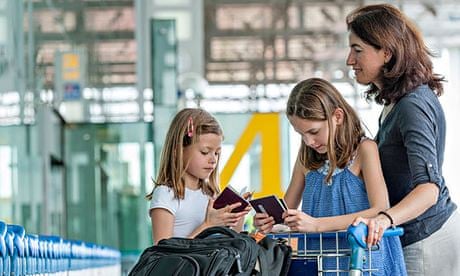Going through passport control after returning from a trip abroad with her three children, Helen Perry was asked how they were related. Her response failed to satisfy the woman in the cubicle, who asked for proof that she was their mother. "I said, 'Well, you could ask the children,' " prompting a sharp rebuke from the woman and a demand for written evidence. "My daughter was nearly in tears, and I said, 'Look, I can't prove that they're my children but here they are.' " The woman let the shaken family through.
Divorced from her children's father and remarried with a new surname, Perry set about finding out what proof she would need to avoid a similar upset. She was astonished to find she'd have to carry seven legal documents. In 2010, Perry launched the Parental Passport Campaign, to end the confusion by adding both parents' names to children's passports.
Perry will be hosting a meeting with MPs at Portcullis House on Wednesday, although she claims a change to passport design is all that is needed, rather than an act of parliament. "Theresa May is aware of the campaign," says Perry, "and could make this happen." Perry has found that an estimated 600,000 women over the last five years have been asked to prove kinship when taking their families through UK border control. She has heard from many women who do not share their children's surname (and it is mostly women – a survey last year found that only 4% of children were given their mother's surname). However, a petition that closes in October so far has just 100 signatures.
For anyone travelling without a parent with the same name as the children or other proof of kinship, passport control has a duty to screen for possible child abduction or trafficking. Yet this takes no account of the number of women who don't share their children's surnames or the fact that cohabiting families are the fastest-growing family type in the UK. In addition, a third of women in their 20s now keep their surname when they marry.
Valerie Burgess, who isn't married to her partner, is often stopped flying home to London with her two daughters – aged six and eight. "The most recent case was last October," she says. "He checked all the passports, then said directly to my eldest: 'Who is this lady?' It sent a total panic through my daughters. They thought something was dreadfully wrong. And I felt incredibly embarrassed."
Perry tells of another case in which a British mother and her children were stopped from boarding a connecting flight at Hong Kong. They were detained until she could obtain birth certificates for the children (who, luckily, had been born in Hong Kong), and had to pay for another flight.
The Home Office response is that "a passport is a document for travel. Its fundamental purpose would change if it were to be used to identify a parental relationship." Perry disagrees: "Everybody uses their passport to prove who they are." And, as she argues, including parents' names on children's passports would make it easier for border control to carry out their work without all these distracting red herrings.

Comments (…)
Sign in or create your Guardian account to join the discussion